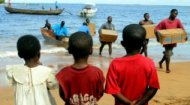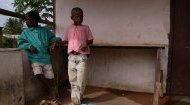|
|
|
Life in Liberia |
Life in Liberia |
Life in Liberia | Life in Liberia |
Find out all about Liberia in a series of information articles, latest daily news, videos, and images.
More >
|
 |

In 2020, child mortality rate for Liberia was 78.3 deaths per 1,000 live births reflecting poor health care provision in the country, particularly in rural areas. This general lack of health resources is compounded by the country's hot, tropical climate that is ripe for numerous diseases from cholera, lymphatic filariasis, yellow fever, river blindness, to the country's greatest health threat of malaria. The two devastating civil wars practically wiped out water and sanitation infrastructure and, even today, less than 10% of Liberians have access to safely managed drinking water and sanitation services. Liberia also s one of the lowest electricity access rates in the world, with only about 8% of households connected to the national grid. Even in urban areas such as Monrovia, the supply is intermittent while in rural areas mains elecricity (as opposed to solar) is available to around just 2% of the population. Heavily dependent on foreign aid, for 70% of the population life means working in agriculture whilst just 8% are engaged in industry with 22% involved in the service sectors. Given that agriculture was the basis of life for most Liberian families the war caused irreparable damage, with villages destroyed, farm building gutted and many of those working on the land forced to flee for safety. As one farmer noted "When I came back, there was nothing." Starting from nothing is not easy in any walk of life, but never more so in agriculture when it can takes years to start harvesting worthwhile crops including coffee, cocoa, rice, cassava, palm oil, sugarcane and bananas. Such is the psychological impact of the two civil wars, many are fearful that warfare will break out again and are wary of building permanent structures that could again be razed to the ground. Reconstruction efforts have also been slowed by the destruction caused to the country's infrastructure with few paved roads and an inadequate rail system. The video (above) gives further insights into daily life in Liberia. |








